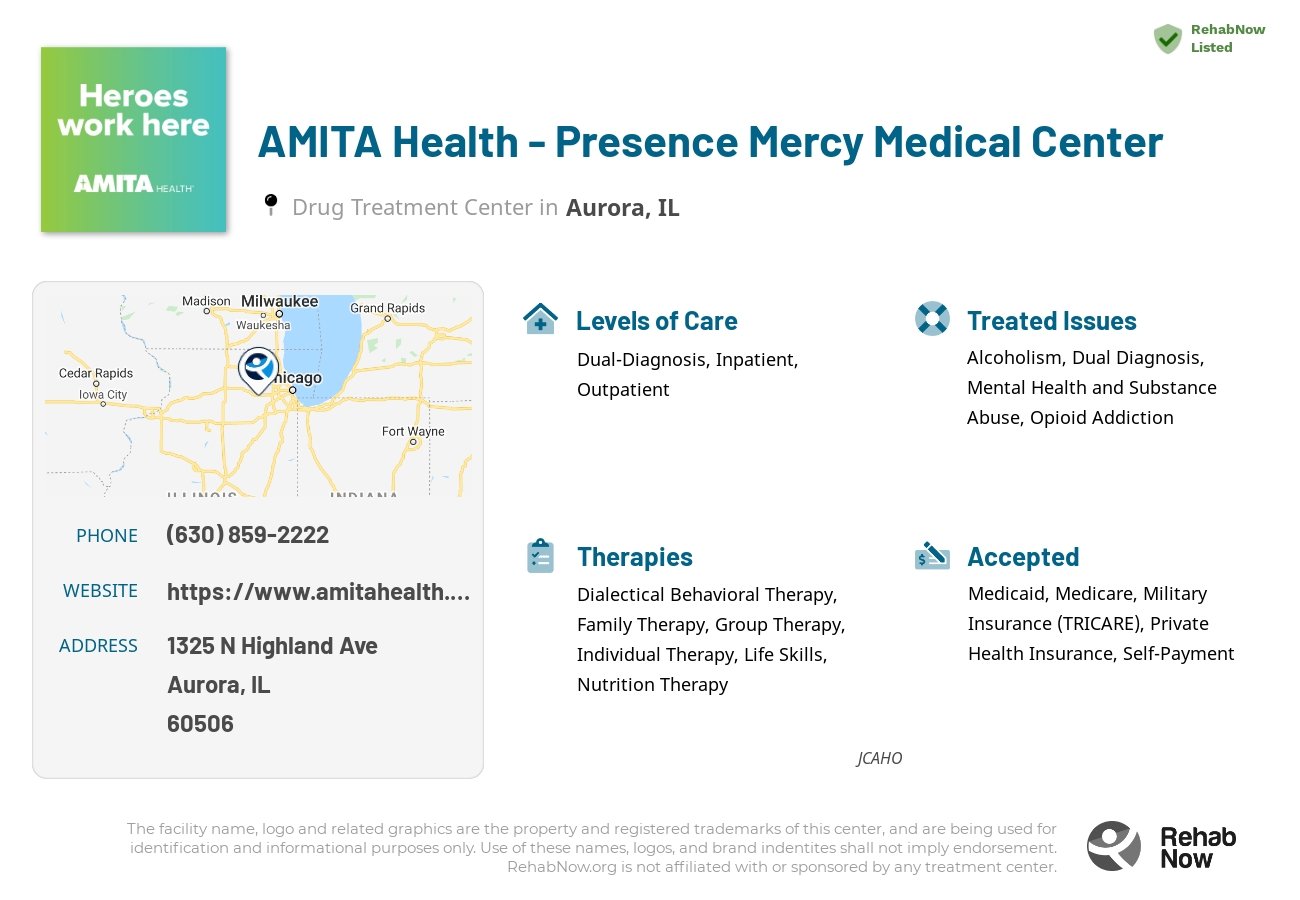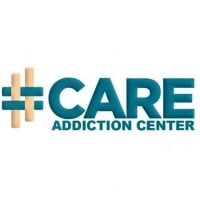AMITA Health - Presence Mercy Medical Center
Drug Rehab Center in Aurora, Illinois
AMITA Health - Presence Mercy Medical Center is one of the leading drug rehab centers in Aurora, IL offering comprehensive inpatient and outpatient programs tailored to individual needs with 293 beds available and accredited by JCAHO, providing dual-diagnosis treatment, aftercare support, partial hospitalization and inpatient recovery services, as well as accepting insurance coverage for those who qualify.
About This Aurora, IL Facility
AMITA Health - Presence Mercy Medical Center is a highly accredited alcoholism and drug addiction treatment facility located in Aurora, Illinois. With its JCAHO certification, this 293-bed facility offers comprehensive treatment for individuals suffering from alcoholism, opioid addiction, dual diagnosis, drug addiction, substance abuse, and mental health issues. The facility provides a range of services including dual-diagnosis treatment, inpatient care, outpatient programs, aftercare support, and partial-hospitalization levels of care. AMITA Health - Presence Mercy Medical Center is affiliated with AMITA Health Addiction Services and is recognized for its commitment to providing top-notch care to those in need.
AMITA Health - Presence Mercy Medical Center goes beyond just treating addiction and substance abuse. The facility offers a holistic approach to care, addressing the mental health aspect of addiction as well. Through their dual-diagnosis program, individuals can receive comprehensive treatment for both their addiction and any underlying mental health conditions. The facility provides a variety of treatment options, including inpatient care for those needing round-the-clock supervision and support, outpatient programs for individuals who require flexibility in their treatment schedule, and partial-hospitalization levels of care for those transitioning from intensive treatment to independent living. AMITA Health - Presence Mercy Medical Center also provides aftercare support, ensuring that individuals have access to the necessary resources and support system for continued recovery.
Genders
Ages
Modality
Additional
Accreditations

JCAHO
Conditions and Issues Treated
Substance abuse refers to the intensive and inappropriate use of psychoactive substances. Psychoactive substances are those that affect brain function. These include illegal drugs, alcohol, and even the excessive use of prescription drugs. The overuse of psychoactive substances leads to severe physical or psychological dependence. It also affects the social life and relationships of the affected individual. Substance abuse is treatable.
The duration of treatment at AMITA Health - Presence Mercy Medical Center in Aurora can require weeks or even months depending on the severity of the condition as there is a risk of relapse. Treatment options include medications, counseling sessions, various types of behavioral therapy, and group therapy in different combinations.
Addiction to prescription opioid painkillers like oxycodone and hydrocodone, and illicit opioids such as heroin, leads to potentially life-threatening withdrawal symptoms when discontinued. Opioid addiction treatment typically involves an inpatient stay at facilities like AMITA Health - Presence Mercy Medical Center to make sure they get through withdrawal safely. Treatment also includes comprehensive mental health counseling.
Mental illness includes conditions such as anxiety, depression, schizophrenia, bipolar disorder. It can also happen that mental illness causes drug addiction and vice versa. AMITA Health - Presence Mercy Medical Center in Illinois knows it is vital to diagnose dual diagnosis or co-occurring disorder.
Levels of Care Offered
This center offers a variety of custom treatment tailored to individual recovery. Currently available are Aftercare Support, Dual-Diagnosis, Inpatient, Outpatient, Partial-Hospitalization, with additional therapies available as listed below.
Inpatient programs are intensive regimes that require individuals suffering from serious addictions to admit themselves into a controlled environment. Inpatient programs in Illinois generally span over 28 days to six months. The first step in an inpatient program is medically assisted detox. Doctors and addiction specialists at AMITA Health - Presence Mercy Medical Center monitor the individual’s vital signs as the drugs leave their system. Some inpatient rehab programs also provide counseling for family members to provide encouragement and emotional support. In inpatient programs, patients have access to 24-hour medical supervision.
To assist with alcohol or opioid abuse, or a co-occurring condition, AMITA Health - Presence Mercy Medical Center offers an outpatient treatment program. For their rehabilitation and other services, the Illinois patient will go to the treatment center, yet return home every night. After most of the program is completed, the level of mandatory participation reduces.
To protect those dealing with acute symptoms of addiction, a partial hospitalization program is ideal in the treatment process. This ensures that the person is cared for in a hospital-like environment in Aurora, IL during the battle against drug addiction effects. Most PHPs need therapy for about six hours, at least three days a week.
Treatment is just a first step in sustaining sobriety. After rehabilitation, counseling for aftercare helps the person adapt to a life without drugs. A sober living facility in Aurora, job therapy, or educational assistance may be included in this service, managed by AMITA Health - Presence Mercy Medical Center. This is when a preventive strategy for relapse starts to take shape.
AMITA Health - Presence Mercy Medical Center‘s Therapies & Programs
In addiction recovery at AMITA Health - Presence Mercy Medical Center, therapy plays a significant role. This helps patients get to the root of their addiction and discover how the problems that contributed to their use can be handled better. Therapy can be performed in a group and one on one settings. The patient interacts with the therapist in a one-on-one atmosphere during individual therapy. This encourages them to reflect on the underlying addiction problems and develop ways to avoid potential future abuse.
Recovering from addiction involves recovering relationships as well. One of the most common areas of stress and damage during addiction is in intimate relationships. Couples therapy at AMITA Health - Presence Mercy Medical Center can rebuild trust and joy that may have been damaged. Addiction involves everyone in the family, not only the addict.
Family roles can change in damaging ways that may require professional help to rebalance. Successful intimate relationships can decrease the chances for relapse by ensuring a healthy environment after rehab in Aurora, IL.
Addiction and alcoholism affect the entire family. For this reason, family therapy is vital to a person’s recovery from addiction. In contrast to couples counseling, family therapy at AMITA Health - Presence Mercy Medical Center may include siblings, children, parents, and other significant people in the recovering person’s life. Family support is one of the most important pillars of recovery.
Many people turn to drugs and alcohol as a way of processing trauma that has affected them in the past. Trauma can include abuse, neglect, the loss of a loved one and other unpleasant incidents. Trauma therapy at AMITA Health - Presence Mercy Medical Center helps patients process trauma. It gives them the tools to deal with it in a healthier manner.
Dialectical behavioral therapy (DBT) is a type of Cognitive Behavioral Therapy that focuses on eliminating specific negative thoughts such as suicidal thoughts that can potentially lead to an individual inflicting self-harm. It is useful in the treatment of patients exhibiting uncontrollable emotions, intense mood swings, and borderline personality disorders.
The term “Dialectic” means the integration of opposites. In the substance abuse context, DBT refers to accepting the patient’s addiction and working to change their thoughts and behavior. It improves life skills such as controlling the intense emotions without reacting impulsively, resolving the interpersonal conflicts effectively, and promoting awareness about self and others.
Cognitive Behavioral Therapy (CBT) examines the relationship between a patient’s thoughts, feelings and behaviors. AMITA Health - Presence Mercy Medical Center aims to establish a healthy response to thoughts and feelings as an alternative to turning to drugs and alcohol. It also promotes healthy communication between addicts and those around them. It is and effective therapy for people suffering with all types of addictions.
Rational Emotive Behavior Therapy (REBT) is a type of cognitive therapy. It is based on the principle that irrational thoughts are responsible for the emotional and behavioral changes in addiction. So, the therapy starts with identifying the underlying irrational thoughts. These thoughts are then challenged and opposed logically and then replaced with positive thoughts. It also helps to change unwanted behavior with techniques such as meditation.
By imparting positive thoughts and emotions, Rational Emotive Behavior Therapy (REBT) makes the individual self-reliant with a capacity to handle the emotional and behavioral issues in future by themselves without professional help. This self-dependence benefits the patients and prevent relapses.
Life skills pertain to the skill sets a person should possess to become successful in life. Examples are time management, budgeting, and social abilities. Life skills therapy highlights the fact that addiction recovery is more than just a person’s ability to go through their day-to-day without resorting to substance use in Aurora, IL once they leave the facility.
The recovery technique used by Alcoholics Anonymous is the 12 step program, but it can relate to any form of addiction. The 12 steps that addicts must take on the road to recovery are explained. Measures include acknowledging that you have a problem and agreeing to turn around your life. The curriculum, instructed by AMITA Health - Presence Mercy Medical Center, also requires a belief in a greater power and making amends to others.
It’s no surprise that diet is a crucial player in one’s well-being. What an individual puts into his or her body becomes the fuel that drives the mental and physical faculties to perform accordingly. Therefore, nutrition therapy, also known as medical nutrition therapy (MNT), guarantees that an individual is providing his or her mind and body with proper nourishment.
The right diet can improve a person’s general outlook, sleep habits, and thought processing skills. MNT also lowers the occurrence of chronic diseases such as adult-onset diabetes. Dieticians at AMITA Health - Presence Mercy Medical Center in Aurora, Illinois believe that nutrition therapy is the key to making significant lifestyle changes, especially when it comes to personal care.Nicotine Replacement Therapy (NRTC) used products like skin patches and gum to deliver nicotine into the bloodstream of people trying to quit smoking. This helps break the habits associated with smoking. The very low doses of nicotine managed by AMITA Health - Presence Mercy Medical Center prevent cravings while helping people make a gradual transition to complete smoking cessation.
Contingency Management (CM), also called motivational incentives, is a type of pure behavioral therapy. It’s based on the idea that behavior is shaped, motivated, or controlled by its outcomes. CM is a clinical application at AMITA Health - Presence Mercy Medical Center of operant conditioning, which helps clients eliminate unwanted behaviors by the use of positive and negative reinforcement.
Patient Experience
Experiential Therapy at AMITA Health - Presence Mercy Medical Center
Experential therapy is a unique type of therapy that deals with the subconscious mind. This treatment available at AMITA Health - Presence Mercy Medical Center in Aurora, IL encourages individuals to work out their issues with their inner self through synchronous experiences.
This non-traditional treatment method makes use of the physique and encourages people to take part in various physical and emotional activities, movements, and practices. Some of the most common examples of experiential therapy are equine therapy, music therapy, adventure therapy, and role playing. Through these various methods, an individual is believed to heal from trauma, negative emotions, and hurtful memories faster. Moreover, experiential therapy is known to have enduring results which can be beneficial to sufferers.
Payment Options Accepted
For specific insurance or payment methods please contact us.
Is your insurance accepted?
Ask an expert, call (888) 674-0062
AMITA Health Addiction Services Associated Centers
Discover treatment facilities under the same provider.
- AMITA Health Alexian Brothers Medical Center in Elk Grove Village, IL
- AMITA Health Holy Family Medical Center, Keys to Recovery in Des Plaines, IL
- AMITA Health - Adventist Hinsdale Hospital New Day Center in Westmont, IL
- AMITA Health Medical Group Behavioral Medicine Westmont in Westmont, IL
- AMITA Health Resurrection Medical Center Chicago in Chicago, IL
Learn More About AMITA Health Addiction Services Centers
Additional Details
Specifics, location, and helpful extra information.
Aurora, Illinois 60506 Phone Number(630) 859-2222 Meta DetailsUpdated November 25, 2023
Staff Verified
Patient Reviews
There are no reviews yet. Be the first one to write one.
Aurora, Illinois Addiction Information
In 2016, more than 2,350 Illinoisans died from drug overdoses. More than 5,500 deaths annually occur in Illinois due to the abuse of alcohol and other drugs. 7.17% of Illinois residents reported using illicit drugs in the past month (2018). Substance abuse costs the state approximately $3.5 billion every year.
In Aurora, Illinois, the number of people addicted to drugs has increased from 6% to 8%. This puts them at higher risk for developing one or more serious health problems such as cancer, AIDS, heart disease, stroke, and lung infection. The most common drugs involved in these overdoses were opioids (1,946 deaths). Some programs focus on outpatient care, while others offer residential treatment.
Treatment in Nearby Cities
- Belleville, IL (242.3 mi.)
- Dekalb, IL (24.0 mi.)
- Orland Park, IL (26.6 mi.)
- Beardstown, IL (164.3 mi.)
- West Chicago, IL (9.3 mi.)
Centers near AMITA Health - Presence Mercy Medical Center
The facility name, logo and brand are the property and registered trademarks of AMITA Health - Presence Mercy Medical Center, and are being used for identification and informational purposes only. Use of these names, logos and brands shall not imply endorsement. RehabNow.org is not affiliated with or sponsored by AMITA Health - Presence Mercy Medical Center.








